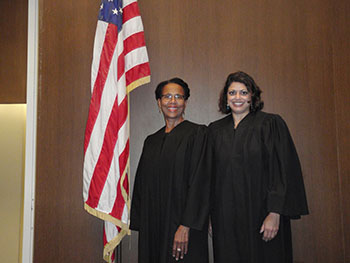Feature: Spotlight on REM members—A Tale of Two “Sisters-in-the-Law” and Their Parallel and Intertwined Pathways to the Bench
 Congratulations are in order for the recent appointments of J. Imani Drew and Geraldine A. D’Souza to the bench. On April 19, 2016, The Honorable J. Imani Drew became the first black female judge in Kankakee County upon her appointment. J. Imani Drew, a longtime attorney in Kankakee, has always been a trailblazer and leader within the legal community, overcoming many obstacles on her road to becoming an attorney. The odds were against her as a resident of Chicago’s Southside, yet she prevailed.
Congratulations are in order for the recent appointments of J. Imani Drew and Geraldine A. D’Souza to the bench. On April 19, 2016, The Honorable J. Imani Drew became the first black female judge in Kankakee County upon her appointment. J. Imani Drew, a longtime attorney in Kankakee, has always been a trailblazer and leader within the legal community, overcoming many obstacles on her road to becoming an attorney. The odds were against her as a resident of Chicago’s Southside, yet she prevailed.
Taking on law school while dealing with the challenge of one-year old twins, Drew was able to graduate from the University of Iowa Law School and pass the bar exam. In 1983, she became the first black prosecutor in Kankakee County. From 1989-2001, she was the lead prosecutor for felony sex offenses. Judge Drew was the first lawyer in her family, the first African-American female attorney to live and work in Kankakee County, the first African-American attorney to serve as corporation counsel for the City of Kankakee (1985-1986) and the first to open her own law practice (1985). Finally, her appointment to the bench makes her only the second black judge in Kankakee County history. We hope one day she will share with us her experience being the FIRST in so many positions—which can feel like a burden, a blessing, a huge responsibility, a joy or something else entirely, depending upon the individual carrying that ‘mantle’.
Geraldine D’Souza, the daughter of Indian and Chilean immigrants, earned her bachelor’s degree at the University of Illinois at Urbana-Champaign and she received her Juris Doctorate from IIT Chicago-Kent College of Law. She has been licensed to practice law in the state of Illinois since 1992. Judge D’Souza comes from a well-established family, but she was nevertheless the first lawyer and is now the first judge in her family. Before her appointment, D’Souza was a Cook County Assistant State’s Attorney for an impressive twenty-two years, serving as first chair at 26th and California. As a testament to her hard work, Judge D’Souza has received a number of ISBA appointments, including to the Criminal Justice Section Council for which she is the Vice-Chair this bar term, and the Racial and Ethnic Minorities and the Law Committee on which she continues to serve. Additionally, she was elected to the Assembly, the ISBA’s policy-making body.
The history of these two jurists and the crossing of their career paths spans over two decades. They both started their law careers at the Kankakee County State’s Attorneys’ Office where they worked together as Assistant State’s Attorneys from 1992-1993. Their friendship and bond has continued as their careers have progressed. They are, if you will, sisters-in-the-law. According to Judge Imani, “Judge D’Souza was and is a joy to work with. She brought a fresh excitement and perspective to our office. Her work, of course, was exemplary.”
Both Judges Drew and D’Souza have had tremendous accomplishments in their careers. They are pillars within our profession and are examples to their communities that nothing is impossible. Achieving true diversity on the bench is still a barrier that needs to be overcome. Recognizing the importance of diversity in the legal profession is perhaps even more important. According to the latest figures published by the National Center for State Courts in Diversity on the Bench: Illinois, the number of women judges on the bench is approximately 33%, the number of African-American judges on the bench is approximately 16%, and the number of Native American judges is approximately 0%. Clearly, we still have a long way to go.
As ISBA President Vincent Cornelius has stated, we as members of the bench and bar must remember that implicit bias exists in all of us. It is a fact that cannot be denied. Each day we bring to our courthouse, cases, trials, rulings and judgments, our personal experiences that shape our notions of justice. Therefore, if justice is to be truly blind, and access to the legal system ever to be truly equal, then we must have diversity on the bench. President Cornelius states it best: “Pioneers are remembered more for how they affected the landscape than for the mere fact that they arrived there first.” The appointments of Honorable Judge J. Imani Drew and Honorable Judge Geraldine D’Souza are two big steps in the right direction for our profession and I look forward to seeing the trails that will be blazed by these living legal legends.
